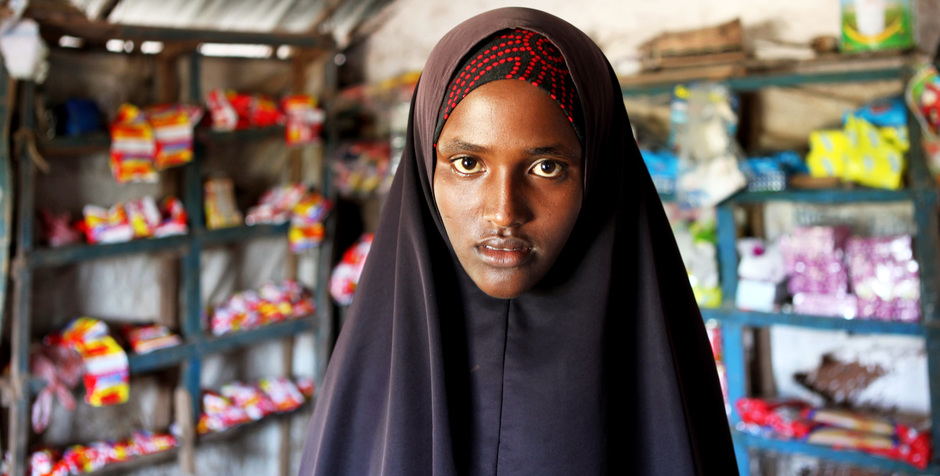Fighting for the Protection of Young Kenyan Girls At the United Nations
When our team of attorneys on the ground in Kenya heard of the imminent danger of young girls in the Samburu region, they raced to the northern Kenyan county to assist in their rescue. Our team learned that girls in this tribe as young as six years old were forced to marry men as old as their fathers and grandfathers, forced to endure the horrific practice of female genital mutilation, and then subjected to a life of rape and slavery.
Partnering with a local non-governmental organization (NGO), our attorneys were able to free two little girls, ages 10 and 13, on their first rescue mission. They then took the plight of these children to the Kenyan court system, demanding that the perpetrators be brought to justice. This national legal battle continues as our case is currently before a Kenyan High Court.
But our fight for justice does not end there. This week, we are taking the Samburu girls’ case to the center of the international stage – the United Nations.
In conjunction with our European affiliate, the European Centre for Law & Justice (ECLJ), the ACLJ just submitted a report to the United Nations’ Human Rights Commission detailing the exploitation of the Samburu girls and urging the Commission to do everything within its power to end the abhorrent tradition of forced child marriages in Kenya.
In our report, we gave a first-hand account of what our team on the ground has witnessed, documented why forced marriages are so detrimental to children, and outlined Kenya’s obligations under international law to protect children from such practices.
In regards to the harmful effects of forced child marriages, we wrote:
Forced child marriages must be stopped in Kenya because they are detrimental to the development and well being of Samburu girls who fall victim to the practice. In 2014, the Office of the United Nations High Commissioner for Human Rights released a report that found that child marriage has significant negative impacts on the child. The report revealed that child marriage undermines the autonomy of young girls, and exposes girls to psychological, economic and sexual violence. The report also found that child marriage is associated with poor health and social outcomes, and is often an obstacle to a girl’s education, employment and economic opportunities.
Our staff in Kenya has witnessed the findings of this U.N. report first-hand. Each young Samburu girl that is rescued is in desperate need of after-care services. When a victim has undergone FGM before she is rescued, the team often rushes her to the hospital to receive emergency medical care to deal with anemia and other medical complications associated with her injuries. Nearly every girl rescued is in need of counselling services to heal from her abuse, and nearly every girl is in need of educational support as she was forced to leave school when she was betrothed to her “husband.”
Our submission went on to break down Kenya’s obligation under international law and human rights norms. Listing the many treaties of which Kenya is a signatory that expressly and implicitly prohibit child marriages, we explained:
For example, by signing and ratifying [Convention on the Elimination of All Forms of Discrimination Against Women], Kenya has committed to ensuring that no child marriage has any legal effect, and that all women have the right to freely choose their spouse, a level of consent a child is unable to give. By joining the [International Covenant on Economic, Social, and Cultural Rights] and the [International Covenant on Civil and Political Rights], Kenya committed to outlaw child marriages by agreeing that all marriages must be entered into freely by both spouses, and a child is incapable of this level of consent.
Citing customary international law and resolutions passed by international bodies dealing with forced child marriages, we detailed how international human rights norms should influence Kenya’s actions on behalf of their vulnerable young girls:
Kenya is obligated to protect children from child marriages under customary international law, derived from legal norms in the Universal Declaration of Human Rights. The Universal Declaration recognizes the right of all people to freely and fully consent to marriage. A child is too young to cognitively meet this “free and full consent” requirement, so child marriage is against this customary international law.
Moreover, several international bodies, of which Kenya is a member, have passed non-binding resolutions and recommendations condemning forced child marriages, and urging all member states to enact and enforce laws to protect children from such practices. Most notably, as a co-sponsor to the UN General Assembly Resolution on Child, Early and Forced Marriages, Kenya pledged its support to ending the harmful practice of child marriage, acknowledging that it is an abusive practice that violates the human rights of children.
Ultimately, we urged the Human Rights Commission “to publically acknowledge, condemn, and further investigate” the plight of Samburu girls, and “to demand that Kenya prosecute all perpetrators of these abhorrent practices.”
It is time for the girls of the Samburu tribe to be set free from the bondage of forced child marriage. No longer should one more little girl be robbed of her childhood and treated as property.
We, at the ACLJ, will not back down from our local efforts or our international advocacy until every little girl in Kenya is guaranteed her most fundamental human rights and protected by the rule of law.
As we continue to fight in court, in villages, and on the world’s stage, join us by signing the petition below.
